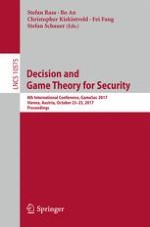2017 | OriginalPaper | Chapter
Proactive Defense Against Physical Denial of Service Attacks Using Poisson Signaling Games
Authors : Jeffrey Pawlick, Quanyan Zhu
Published in: Decision and Game Theory for Security
Publisher: Springer International Publishing
Activate our intelligent search to find suitable subject content or patents.
Select sections of text to find matching patents with Artificial Intelligence. powered by
Select sections of text to find additional relevant content using AI-assisted search. powered by
